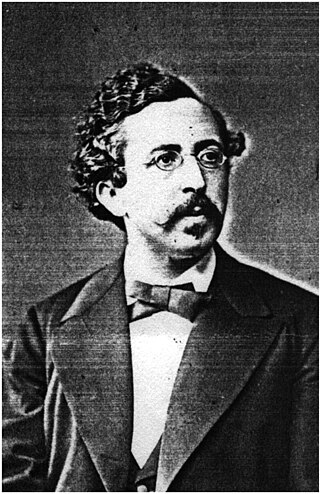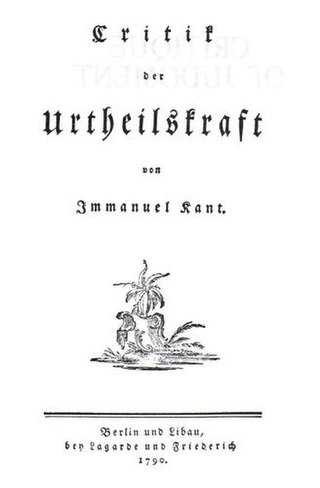Related Research Articles

Aesthetics is the branch of philosophy concerned with the nature of beauty and the nature of taste; and functions as the philosophy of art. Aesthetics examines the philosophy of aesthetic value, which is determined by critical judgements of artistic taste; thus, the function of aesthetics is the "critical reflection on art, culture and nature".

Ethics or moral philosophy is a branch of philosophy that "involves systematizing, defending, and recommending concepts of right and wrong behavior". The field of ethics, along with aesthetics, concerns matters of value; these fields comprise the branch of philosophy called axiology.

Immanuel Kant was a German philosopher and one of the central Enlightenment thinkers. Born in Königsberg, Kant's comprehensive and systematic works in epistemology, metaphysics, ethics, and aesthetics have made him one of the most influential and controversial figures in modern Western philosophy.
In ethics and the social sciences, value theory involves various approaches that examine how, why, and to what degree humans value things and whether the object or subject of valuing is a person, idea, object, or anything else. Within philosophy, it is also known as ethics or axiology.

Analytic philosophy is a branch and tradition of philosophy using analysis, popular in the Western world and particularly the Anglosphere, which began around the turn of the 20th century in the contemporary era in the United Kingdom, United States, Canada, Australia, New Zealand, and Scandinavia, and continues today. Analytic philosophy is often contrasted with continental philosophy, coined as a catch-all term for other methods, prominent in Europe.

Friedrich Daniel Ernst Schleiermacher was a German Reformed theologian, philosopher, and biblical scholar known for his attempt to reconcile the criticisms of the Enlightenment with traditional Protestant Christianity. He also became influential in the evolution of higher criticism, and his work forms part of the foundation of the modern field of hermeneutics. Because of his profound effect on subsequent Christian thought, he is often called the "Father of Modern Liberal Theology" and is considered an early leader in liberal Christianity. The neo-orthodoxy movement of the twentieth century, typically seen to be spearheaded by Karl Barth, was in many ways an attempt to challenge his influence. As a philosopher he was a leader of German Romanticism.
Alexander Gottlieb Baumgarten was a German philosopher. He was a brother to theologian Siegmund Jakob Baumgarten (1706–1757).

Hermann Cohen was a German Jewish philosopher, one of the founders of the Marburg school of neo-Kantianism, and he is often held to be "probably the most important Jewish philosopher of the nineteenth century".

The Critique of Judgment, also translated as the Critique of the Power of Judgment, is a 1790 book by the German philosopher Immanuel Kant. Sometimes referred to as the "third critique", the Critique of Judgment follows the Critique of Pure Reason (1781) and the Critique of Practical Reason (1788).

Kantianism is the philosophy of Immanuel Kant, a German philosopher born in Königsberg, Prussia. The term Kantianism or Kantian is sometimes also used to describe contemporary positions in philosophy of mind, epistemology, and ethics.

In aesthetics, the sublime is the quality of greatness, whether physical, moral, intellectual, metaphysical, aesthetic, spiritual, or artistic. The term especially refers to a greatness beyond all possibility of calculation, measurement, or imitation.

In late modern continental philosophy, neo-Kantianism was a revival of the 18th-century philosophy of Immanuel Kant. The neo-Kantians sought to develop and clarify Kant's theories, particularly his concept of the thing-in-itself and his moral philosophy.

In aesthetics, the concept of taste has been the interest of philosophers such as Plato, Hume, and Kant. It is defined by the ability to make valid judgments about an object's aesthetic value. However, these judgments are deficient in objectivity, creating the 'paradox of taste'. The term 'taste' is used because these judgments are similarly made when one physically tastes food.
Discourse ethics refers to a type of argument that attempts to establish normative or ethical truths by examining the presuppositions of discourse. The ethical theory originated with German philosophers Jürgen Habermas and Karl-Otto Apel, and variations have been used by Frank Van Dun and Habermas' student Hans-Hermann Hoppe.

Kantian ethics refers to a deontological ethical theory developed by German philosopher Immanuel Kant that is based on the notion that: "It is impossible to think of anything at all in the world, or indeed even beyond it, that could be considered good without limitation except a good will." The theory was developed in the context of Enlightenment rationalism. It states that an action can only be moral if (i) it is motivated by a sense of duty and (ii) its maxim may be rationally willed a universal, objective law.

Alessandro Ferrara is an Italian philosopher, professor of political philosophy at the University of Rome Tor Vergata and former president of the Italian Association for Political Philosophy. He also teaches legal theory at Luiss Guido Carli University in Rome.
Béatrice Longuenesse is a French philosopher and academic, who is the Silver Professor of Philosophy Emerita at New York University. Her work focuses on Immanuel Kant, Georg Wilhelm Friedrich Hegel, and the philosophy of mind. She is a fellow of the American Academy of Arts and Sciences. Longuenesse is one of the most prominent living Kant scholars, and her works have generated significant discussion around parts of Kant's corpus that were previously largely overlooked.
Sally Sedgwick is an American philosopher. She is a professor of philosophy at Boston University, and was previously the LAS Distinguished Professor at the Department of Philosophy, University of Illinois at Chicago (UIC).

Teleology is a philosophical idea where natural phenomena are explained in terms of the purpose they serve, rather than the cause by which they arise.
David Norman Rodowick is an American philosopher, artist, and curator. He is best known for his contributions to cinema and media studies, visual cultural studies, critical theory, and aesthetics and the philosophy of art. He became a French citizen in 2002 though retains dual citizenship with the United States.
References
- ↑ "Hannah Ginsborg". Philosophy.berkeley.edu. Retrieved 2014-08-01.
- ↑ "Hannah Ginsborg - Biographical information". Philosophy.berkeley.edu. 2014-04-28. Retrieved 2014-08-01.
- ↑ Wenzel, C. H. (2009), Kant's Aesthetics: Overview and Recent Literature. Philosophy Compass, 4: 380–406. doi: 10.1111/j.1747-9991.2009.00214.x
- ↑ Kukla, R. 2006. "Placing the Aesthetic in Kant's Critical Epistemology," in Aesthetics and Cognition in Kant's Critical Philosophy (Cambridge: Cambridge University Press), 3
- ↑ Stratton-Lake, P. (1998) Review of Reclaiming the History of Ethics, International Journal of Philosophical Studies, 6:3, 445-473, DOI: 10.1080/096725598342064Review of Reclaiming the History of Ethics
- ↑ Zuckert, R (2007). Kant on Beauty and Biology. (Cambridge: Cambridge University Press), 84n.28
- ↑ Interview with Hannah Ginsborg, The Reasoner, Vol. 9 No. 5, July 2015, ISSN (Online) 1757-0522.
- 1 2 Linda Palmer (2008). A Universality Not Based on Concepts: Kant's Key to the Critique of Taste. Kantian Review, 13, pp 1-51. doi:10.1017/S1369415400001084.
- ↑ Teufel, Thomas (2011). Kant's Non-Teleological Conception of Purposiveness. Kant-Studien. Volume 102, Issue 2, Pages 232–252, ISSN (Online) 1613-1134, ISSN (Print) 0022-8877, DOI: 10.1515/kant.2011.017
- ↑ see Ginsborg's CV
- ↑ Adrian Haddock, "Meaning, Justification, And 'Primitive Normativity'", Proceedings of the Aristotelian Society Supplementary Volume lxxxvi doi: 10.1111/j.1467-8349.2012.00212.x
- ↑ Whiting, Daniel (2013): What is the Normativity of Meaning?, Inquiry: An Interdisciplinary Journal of Philosophy, DOI:10.1080/0020174X.2013.852132 (p. 8 n. 23)
- ↑ See Ginsborg's cv